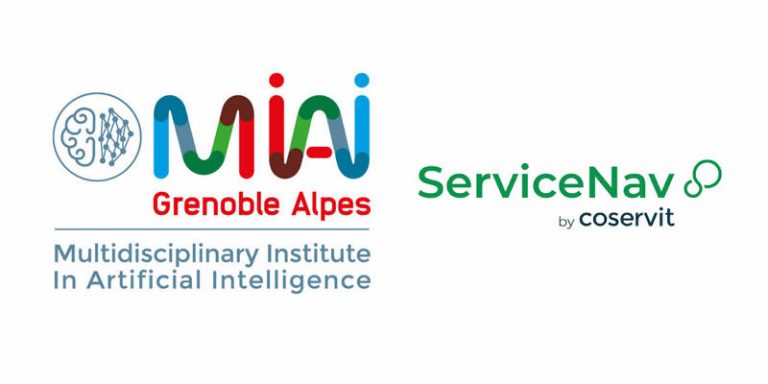
For several years, the multidisciplinary institute in Artificial Intelligence of Grenoble has been collaborating with companies, SMEs and laboratories on specific projects. Among these projects is ServiceNav, Coservit’s SaaS monitoring platform, which has enabled the Grenoble Computer Science Laboratory (LIG) to make progress in the field of causality with a real use case.
In 2014, within the framework of a governmental project called “Fond Unique Interministériel” – a programme allowing the financing of R&D projects for a short or medium term market launch by associating the skills of large companies, SMEs and laboratories, Coservit and the LIG got closer and started a succession of common projects: in 6 years, 4 Artificial Intelligence topics could be treated, involving about 20 experts and 10 publications of articles in scientific journals.
Eric Gaussier, director of the multidisciplinary institute in Artificial Intelligence :
“Few teams in France are interested in the discovery of causal relations in time series. As a result of their work on this subject, Coservit and the Grenoble Computer Science Laboratory have acquired leading expertise in the field of causality. »
Rachid Mokhtari, R&D Director at Coservit :
“As ServiceNav is a SaaS solution, the volume of objects supervised is not controlled by Coservit: the platform must therefore be scalable, robust, automated and autonomous for a minimum cost of maintenance and time spent in order to ensure the availability rate contracted with customers (99.75%). This is also the case for OnPremise platforms. Today the elements supervised are essentially computer equipment (servers, switches, firewalls, routers, IP cameras, etc.). Tomorrow it will be a question of supervising connected objects in large numbers! We must be ready for these future challenges. »
Business challenges
Beyond the scalability of ServiceNav, the research work with the LIG has aimed to add Artificial Intelligence to supervision in order to meet the following uses:
- Reduction of false positives and false negatives : The market reports a number of false positives ranging from 30 to 80% for a conventional supervision solution. For example: for an average of 50 incidents per day, 25 of them are really not incidents. This is due to incorrectly configured thresholds: either too high or too low. This means that operators spend half of their time on alerts that are not incidents or that are not priority alerts: time spent on useless actions, loss of confidence in the monitoring solution …
- Incident prediction : When a critical problem occurs, the operating crews are in “firefighter” mode, focused on that emergency. Whether during the day or during on-call duty, the stress generated is enormous and the pressure from management or users is complicated to manage. Anticipating incidents with enough anticipation is therefore a solution for an organized and serene way of working, allowing at the same time to obtain a better quality of service and therefore higher availability rates of business applications.
- Identify the source of a problem as quickly as possible – Root Cause Analysis: Getting to the source of a complex problem takes time. The objective is to reduce this resolution time as much as possible through analysis and reasoning assisted by Artificial Intelligence.
The Answer
Eric Gaussier: “The LIG is one of the most important computer laboratories in France, working in particular on distributed computing and the processing of large volumes of data. The LIG’s research teams are interested in real production data in order to be able to test and prove their algorithms. Coservit with its ServiceNav SaaS monitoring platform and its real-time flows of millions of data was therefore the right candidate. »
As Eric Gaussier explains, “the new issues are focused on causal relations and not just on correlations between objects. This approach is new, difficult and little addressed at the LIG level. ServiceNav’s “root cause analysis” project has therefore enabled the LIG to make progress in the vast field of causality with real use cases. »
The benefits
- Scalability and robustness of the monitoring platform: As a result of these 4 years of research, Coservit now has a strong Big Data competence. Few editors on the market have successfully made the switch to these complex technologies.
- Increasing the availability rates of critical applications: By injecting algorithms into this “big engine” that is Big Data, the prediction of alerts in the near future (+2h, +15h…) or more distant future (+3 months, +15 months…) allows to save availability time, to reduce the pressure on the operating teams both in working hours and also and especially during on-call periods. Rachid Mokhtari: “Working on causality allows us to simplify the analysis of complex systems by focusing on the essential root cause alerts…”.
- Improve the RoI of monitoring systems through operator efficiency and automation
As Rachid Mokhtari points out:
“ServiceNav is now able to reduce noise, i.e. reduce false positives without generating false negatives. Automatic threshold adjustment is the key to achieving up to 70% noise reduction without changing the current paradigm and organisation of operators. Our recommendation system fits with current user processes with little change management. We are now working on behavioral to automatically detect abnormal system changes over a large data set. »
Rachid Mokhtari, R&D Director at Coservit :
“Coservit was confronted with a large number of data analysis models in order to select the most relevant ones and successfully implement them in ServiceNav. Coservit and the LIG spent a lot of time developing, testing, improving and approving these models. This allows Coservit to guarantee greater reliability of their ServiceNav solution to the market. »
Translated from Cas d’usage : le partenariat entre ServiceNav et les experts de l’institut IA de Grenoble









